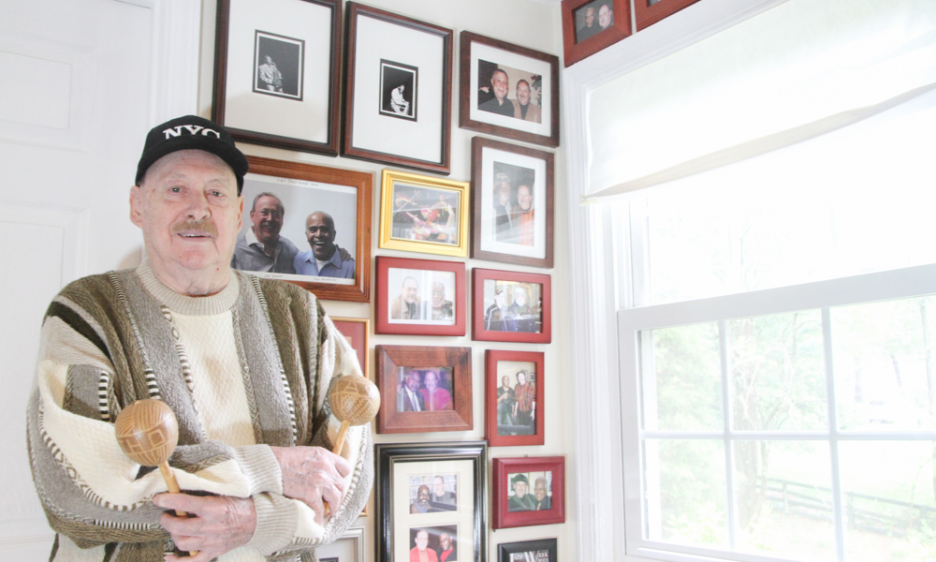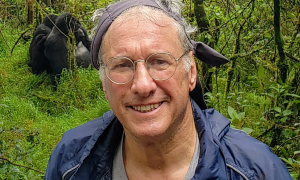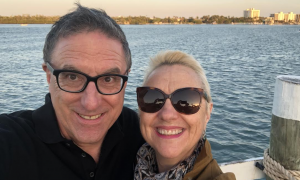Home » Jazz Articles » Out and About: The Super Fans » Meet Don Swann
Meet Don Swann

I walked out of the Port Authority bus station, saw a huge Irish-looking cop, and asked him, “How do I get to Harlem?” He replied, “You Take the A Train.” Wow! Yes! It hit me like a load of bricks. I remember thinking, this is the beginning of the rest of my life!
Tell us a bit about yourself.
I was born in Detroit, but due to poor health caused by the harsh Detroit winters, my parents asked my grandparents to raise my sister and me in our hometown of Murray, Kentucky while we were in elementary school. When the depression ended, my parents returned to Murray.Murray's musical legacy was primarily church hymns and country music. But, as a teen, the radio introduced me to Wolfman Jack, the blues, then R&B, and eventually jazz. It seared into my soul a deep passion to hear more of the music, particularly in live performance.
I was just a farm boy from Kentucky but I knew there was more exciting music out there. So one day, I went to the square and met with a naval recruiter to join the Navy. He asked me if I wanted to be a west coast or an east coast sailor and I told him I wanted to be an east coast sailor, as I liked east coast jazz over west coast.
On my first of many trips to New York City, while stationed in New Jersey, I walked out of the Port Authority bus station, saw a huge Irish-looking cop—he must have been about eight feet tall—and asked him, "How do I get to Harlem?" He replied, "You Take the A Train." Wow! Yes! It hit me like a load of bricks. My life in jazz was entering a new dimension. I remember thinking, this is the beginning of the rest of my life!
What's your earliest memory of music?
Singing in the church choir as a kid and listening to swing era bands on my parents' radio. Still to this day, I believe the big band era was a great time for music in this country.What was your first record?
It was a Benny Goodman big band album purchased at Chuck Simon's Record Shop in Murray, KY. The owner was encouraging us young guys to develop an interest in jazz and he recommended it to me as a starting point.What was the first concert you ever attended?
Murray and Western Kentucky weren't exactly on the "concert" route. My first real "concert" was the Newport Jazz Festival, when I heard Paul Gonsalves play 27 choruses of "Diminuendo and Crescendo in Blue" on his tenor sax with Cat Anderson on squeal trumpet. That was the first and one of the four most moving and memorable concerts in my 70+ years of life in jazz.Was there one album or experience that was your doorway to jazz?
My doorway to jazz started by listening to live R&B and jazz on the jukebox at the Tennessee roadhouses about 11 miles from my dry hometown. The closest live music of that type was in the primarily white roadhouses, but my favorite place—The Big Apple—which was black, and played R&B, was about 11 miles south of Murray. At every opportunity, I'd hitchhike or grab a ride, and—later—drive to catch whoever was performing.As for albums, there's waaay more than one album. I have about 1,000 vinyl albums, about 500 cassettes, and over 5,000 CDs, plus numerous videos, and a bookcase full of jazz books. My wife, Rande, would bring an empty suitcase on each trip to New York City so I could fill it with CDs I couldn't get in Louisville. [Ed. note: Tessa and Andrea send a special shout out to Rande!]
How long have you been going out to hear live music?
Since I was about 15 and routinely slipping out to The Big Apple on the Tennessee line. Also, the jukebox there had nothing but R&B on it. All my friends in high school were into rock and roll, Billy Haley, and all that crap. I was into rhythm and blues, so there's where I went. Big Apple Bill (William Rowe), the owner, let me in. I was the only white kid he'd allow into his joint, but he made me sit in the back, since I was underage. When I was 16 and old enough to drive there, he'd take my keys on entering. Then, when he was closing the joint down at about 2 in the morning, he'd check to see if I was worthy of driving; if he thought I'd had too much to drink, he'd make me spend the night sleeping in a booth until I sobered up. I'm convinced he saved my life many a night keeping me there.How often do you go out to hear live music?
At 83, with Parkinson's and hearing loss, I don't often get out to hear much live music anymore. When I do, it's most often concerts at the University of Louisville School of Music, where I've been a patron and long-time volunteer in the Jazz Studies program. I've been blessed to serve as the hospitality host for the many jazz legends who've performed for its annual Jazz Festival, as well as at its summer Jamey Aebersold Jazz Camps free nightly concerts. That's where my wealth of jazz stories and personal relationships with many jazz musicians really began.But in my Navy years near New York City, it was every weekend, all weekend. And when home in Kentucky, I went to nearly every jazz concert that came to town, and made trips to Cincinnati's The Blue Wisp and Indianapolis's The Jazz Kitchen. On vacation in New York City, Rande and I would often visit as many as three clubs a night to hear as much live jazz as possible, and every jazz brunch/lunch, outdoor concert or other venues we could find. Whenever I traveled with her on business, we'd make it a point to find the best live jazz nearby and drop in.
What is it about live music that makes it so special for you?
Just hanging with the jazz legends I'd hosted while they were at University of Lousiville or Jamey's camps. Seeing their expressions. Watching for the nod of passing the improv from one player to the next. The sweat beading on their foreheads when they gave it their all.One time, sitting on the front row (my favorite spot at any jazz venue) at the Village Vanguard with my wife and sister as the musicians strolled in, several of them saw me, rushed over to say hi, and asked what I was doing in the city and how long I'd be there. My sister was absolutely shocked! She asked, how do those guys know YOU? I told her about my experiences spending a good deal of time with musicians during their brief visits to the University and Jamey's annual jazz camps.
I'm lucky enough to have gotten to know so many musicians through my volunteer work there. Javon Jackson was one of the individuals I was fortunate to get to know. One time, we were in Indianapolis at the Jazz Kitchen to see him and when the gig was up they went back to the green room and I followed. Javon saw me and said "Don! You came all the way out to Indianapolis to hear me!" And I said "No, I came to hear Steve Turre!" And he said, 'Hey man, I'll introduce you!" And he took me over and said "Steve, I want to introduce you to my friend from Louisville, Kentucky, his name is Don Swann." And Steve took my hand and he says: "I've heard of you." That was such a compliment. I'd never even been in the same town as that man.
What are the elements of an amazing concert?
Music that is so memorable that it stays with you forever. I've had about four such experiences in my life: First was the Newport Jazz Festival I mentioned before. I have the album of that concert, but was blessed to have been there. It was a highlight of my life. It was not my first jazz performance, but my first REAL jazz concert. Second was when Robin Eubanks played the featured concert at University of Louisville's JazzFest about a week or two after his long-time partner passed away. You felt every bit of his grief in your bones. Third was when Harry Pickens did a home/farewell concert with his band, bassist Chris Fitzgerald and long-time drummer, Jason Tiemann, when Jason moved to New York City with his wife and family. Fourth was when Harry Pickens did a solo of 'Uno Poco Loco' at my 80th birthday party in our home. (One of many jazz concerts we've hosted in our home over the years, with Harry Pickens being an oft-featured performer.)What is the most trouble you've gone to to get to a jazz performance?
Getting into Charles Lloyd's third and last (sold out) set at The Knitting Factory on our last night in NYC. Rande did her most effective Southern Belle plea and finally got us a standing spot in the back of the balcony. But the most trouble I guess was the time that my best buddy and I decided to "borrow" a railroad crank car and ride it 11 miles to the Big Apple roadhouse and back. That was quite a feat in itself...until the railroad reported their missing car. Our adventure ended on our return, when we rounded the curve back into Murray and the local police were waiting in their patrol car for our arrival. Needless to say, rather than being pleased at my creative mode of transportation, my devoutly law-abiding Baptist parents were appalled to have a "juvenile delinquent" for a son.Is there one concert that got away that you still regret having missed?
How about 400 of them?If you could go back in time and hear one of the jazz legends perform live, who would it be?
Count Basie. I've had the good fortune to hear many of the jazz legends in New York, at the University of Louisville JazzFest, Jamey Aebersold Jazz Camps, the Blue Wisp, the Jazz Kitchen, the (now defunct) Jazz Factory, and other cities across the US. But I can never get enough of the Count.What makes a great jazz club?
It's the imagery when you enter. My favorite was Birdland, and hearing PeeWee announcing acts, telling folks where to sit (or not) when they entered, just running the room as the quintessential jazz club. I always looked young for my age. Entering one night in my civvies, using my Navy ID, PeeWee refused me entry, telling me I was too young. I showed him I was 23! He said he'd seen his fair share of fake IDs and could tell mine was one. It wasn't, but I didn't get in that night.Which club(s) are you most regularly to be found at?
In New York, the Vanguard. At home, most of my jazz life now is at the University of Louisville. We also go to the Jazz Kitchen in Indianapolis. We used to go to the Blue Wisp in Cincinnati and the Jazz Factory in Louisville when they were open.Is there a club that's no longer around that you miss the most?
The Jazz Factory in Louisville, Kentucky. By far, Louisville's finest jazz venue. But it just couldn't make it with all jazz, mostly because it was a bit before its time. Since then, downtown Louisville has added housing and more nightlife. I think it would make it now.Do you have a favorite jazz anecdote?
Attending Max Roach's funeral in NYC. The last day before we returned home, we took my sister on a bus tour of Manhattan. While wandering around the huge, iconic Riverside Church in Harlem, I noticed trolleys of huge speakers, soundboards, mics, and such being wheeled in. I asked a staffer what they were for. She replied, "That's for tomorrow's funeral for a jazz performer who passed a few weeks ago." I asked who. She said Max Roach. I asked if it was open to the public and she said yes, but get in line early as invited guests would be seated first and there might be few spots left. I had a quick breakfast the next morning and then headed from our midtown lodging to get in line, where I found myself in front of Roy Haynes, Yes, Roy Haynes was standing in line behind me, as unbelievable as it may seem. I got in and it was a legendary experience. The most impressive funeral I've ever attended and likely ever will attend.Another story: On one of our trips to New York, while shopping for CDs at Virgin Records, I met and was even kissed by one of my female jazz vocal favorites, Anita O'Day. She was there with her nephew. I didn't recognize her, but I overheard her talking about an Anita O'Day record. Of course, I couldn't resist interrupting. I said, "Oh, Anita O'Day, let me tell you about her! And started off on how great she was." And all of a sudden she grasped my face with both hands, and kissed me on each cheek. And her nephew said, "You have just spoken to Anita O'Day!"
We hear you have a very special Christmas tree ornament.
We attended an Art Blakey concert decades ago at the Kentucky Center for the Performing Arts. While having a drink in the lobby bar after the concert, Blakey strolled in with a band mate and asked if he could take the bar stool next to me. I eagerly replied, "I'd be honored" and ordered a round of drinks for them.I told him how pleased I was to hear him live after enjoying his recorded music for so many years. I mentioned my extensive jazz collection, and that I had nearly everything he'd recorded. We talked about his music and how his groups had evolved. I told him, "You should be recognized in the history books for having taken so many young musicians with raw talent that no one had heard of and spun them off with a PhD in Art Blakey's Jazz University as future Jazz Masters, such as Lee Morgan.
Blakey replied, "You have just given me the greatest compliment of my life." This was very touching to me. I asked for his autograph and he immediately agreed. The only thing to write on was a paper cocktail napkin, which seemed unworthy of a Blakey autograph. I asked the bartender for scissors, cut the starched French cuff off my custom tailored shirt, and offered him my wife's pen. We have his autograph framed as a Christmas ornament and it hangs in our music room to this day.
Vinyl, CDs, MP3s?, streaming?
I used to have about 1,000 vinyl records that our youngest daughter now has due to downsizing. Then I switched to cassettes, which our godson has, and I still have over 5,000 CDs in custom-built cases in my storage room off our music room.If you were a professional musician, which instrument would you play and why?
Acoustic double bass. That range is where I hear the best. Probably the first bassist that really caught my ear was Scott LaFaro. And that brings me into Eddie Gomez. I spent a lot of time with Eddie. He was here for a whole week. Everybody would have breakfast together and I really got acquainted with him. He is a really neat person! He promised to write a song for me, after he asked me how many children I had and I told him I had two biological children, but four if you count the two who adopted us as their parents. They refer to me as "Faux Daddy," and to my screw-ups as Faux Pas! Eddie thought that was so humorous he said, "I need to write a song titled 'Faux Daddy'—it's such a great name—and dedicate it to you." But if I had been a musician I'd have gone in so head first, I'd probably be dead now.What's your desert island disc?
The sharpest one in the jewel case, so I could slit my throat. There's no living if life is confined to just one jazz CD.What do you think keeps jazz alive and thriving?
It's a true creative expression of mankind. A universal language. I've heard jazz musicians who spoke different languages bridge that gap through their music, their improvisation, their interpretation of the notes. It speaks to and through us all. It's a reflection of my soul!Finish this sentence: Life without music would be...
Boring, not worth living!Tags
PREVIOUS / NEXT
Support All About Jazz
 All About Jazz has been a pillar of jazz since 1995, championing it as an art form and, more importantly, supporting the musicians who make it. Our enduring commitment has made "AAJ" one of the most culturally important websites of its kind, read by hundreds of thousands of fans, musicians and industry figures every month.
All About Jazz has been a pillar of jazz since 1995, championing it as an art form and, more importantly, supporting the musicians who make it. Our enduring commitment has made "AAJ" one of the most culturally important websites of its kind, read by hundreds of thousands of fans, musicians and industry figures every month.























